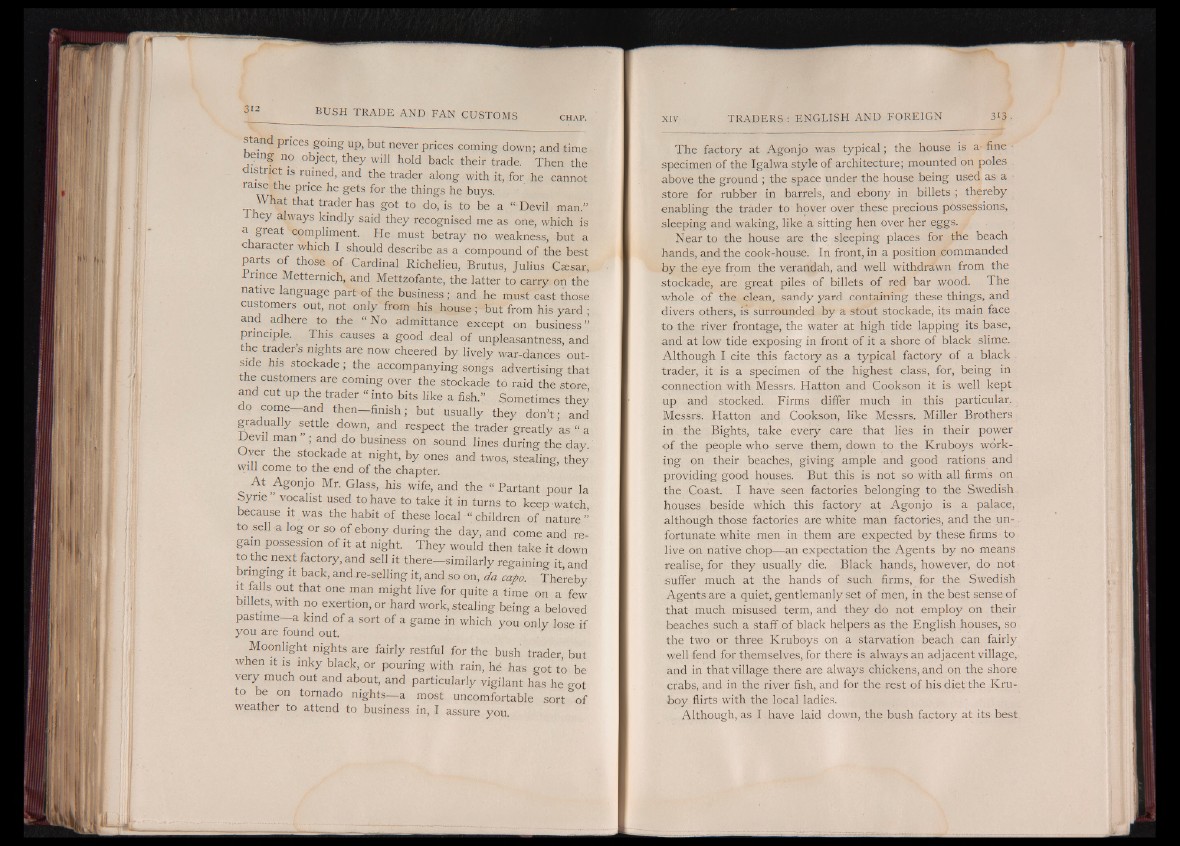
stand prices going up, but never prices coming down; and time
being no object, they will hold back their trade. Then the
istrict is ruined, and the trader along with it, for he cannot
raise the price he gets for the things he buys.
What that trader has got to do, is to be a “ Devil man.”
y always kindly said they recognised me as one, which is
a great compliment. He must betray no weakness, but a
character which I should describe as a compound of the best
parts of those of Cardinal Richelieu, Brutus, Julius Caesar,
Bnnce Metternich, and Mettzofante, the latter to carry on the
native language part of the business ; and he must cast those
customers out, not only from his house; but from his yard ;
and adhere to the “ No admittance except on business”
principle. This causes a good deal of unpleasantness, and
the trader’s nights are now cheered by lively war-dances outside
his stockade ; the accompanying songs advertising that
the customers are coming over the stockade to raid the store
and cut up the trader “ into bits like a fish.” Sometimes they
do come— and then— finish; but usually they don’t ; and
gradually settle down, and respect the trader greatly as “ a
Devil man ” ; and do business on sound lines during the day.
ver the stockade at night, by ones and twos, stealing, they
will come to the end of the chapter.
A t Agonjo Mr. Glass, his wife, and the “ Partant pour la
Syne vocalist used to have to take it in turns to keep watch
because it was the habit of these local “ children of nature”
to sell -a log or so of ebony during the day, and come and regain
possession of it at night. They would then take it down
to the next factory, and sell it there— similarly regaining it, and
bringing it back, and.re-selling it, and so on, da capo. Thereby
it falls out that one man might live for quite a time on a few
billets, with no exertion, or hard work, stealing being a beloved
pastime— a kind of a sort of a game in which you only lose if
you are found out.
Moonlight nights are fairly restful for the bush trader but
when it is inky black, or pouring with rain, he has got to be
very much out and about, and particularly vigilant has he got
to be on tornado nights— a most uncomfortable sort of
weather to attend to business in, I assure you.
The factory at Agonjo was typical; the house is a- fine •
specimen of the Igalwa style of architecture; mounted on poles
above the ground ; the space under the house being used as a ■
store for rubber in barrels, and ebony in billets ; thereby
enabling the trader to hover over these precious possessions,
sleeping and waking, like a sitting hen over her eggs.
Near to the house are the sleeping places for the beach
hands, and the cook-house. In front, in a position commanded
by the eye from the verandah, and well withdrawn from the
stockade, are great piles of billets of red bar wood. The
whole of the clean, sandy yard containing these things, and
divers others, is surrounded by a stout stockade, its main face
to the river frontage, the water at high tide lapping its base,
and at low tide exposing in front of it a shore of black slime.
Although I cite this factory as a typical factory of a black
trader, it is a specimen of the highest class, for, being in
connection with Messrs. Hatton and Cookson it is well kept
up and stocked. Firms differ much in this particular,
Messrs. Hatton and Cookson, like Messrs. Miller Brothers
in the Bights, take every care that lies in their power
o f the people who serve them, down to the Kruboys working
on their beaches, giving ample and good rations and
providing good houses. But this is not so with all firms on
the Coast. I have seen factories belonging to the Swedish
houses beside which this factory at Agonjo is a palace,
although those factories are white man factories, and the unfortunate
white men in them are expected by these firms to
live on native chop— an expectation the Agents by no means
realise, for they usually die. Black hands, however, do not
suffer much at the hands of such firms, for the Swedish
Agents are a quiet, gentlemanly set of men, in the best sense of
that much misused term, and they do not employ on their
beaches such a staff of black helpers as the English houses, so
the two or three Kruboys on a starvation beach can fairly
well fend for themselves, for there is always an adjacent village,
and in that village there are always chickens, and on the shore
crabs, and in the river fish, and for the rest of his diet the Kru-
boy flirts with the local ladies.
Although, as I have laid down, the bush factory at its best